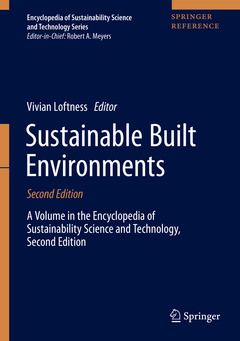Sustainable Built Environments (2nd Ed., 2nd ed. 2020) Encyclopedia of Sustainability Science and Technology Series

Part I: Sustainable Built Environment.- Bioclimatic Design.- Daylighting Controls, Performance, and Global Impacts.- Facades and Enclosures, Building for Sustainability.- Geothermal Conditioning: Critical Sources for Sustainability.- Indoor Environmental Quality and Health Improvement, Evidence-Based Design for.- Natural Ventilation in Built Environment.- Passive House (Passivhaus).- Passive Solar Heating in Built Environment.- Rating Systems for Sustainability.- Regenerative Development and Design.- Resource Repletion, Role of Buildings.- Sustainability Performance Simulation Tools for Building Design.- Sustainable and Healthy Built Environment.- Sustainable Built Environment, Introduction.- Sustainable Design and Construction, Integrated Delivery Processes and Building Information Modeling.- Sustainable Heating Ventilation and Air Conditioning.- Part II: Sustainable Landscape Design, Urban Forestry and Green Roof Science and Technology.- Biodiversity in Cities, Reconnecting Humans with Nature.- Green Infrastructure and Climate Change.- Green Roofs, Ecological Functions.
Date de parution : 09-2020
Ouvrage de 713 p.
17.8x25.4 cm



